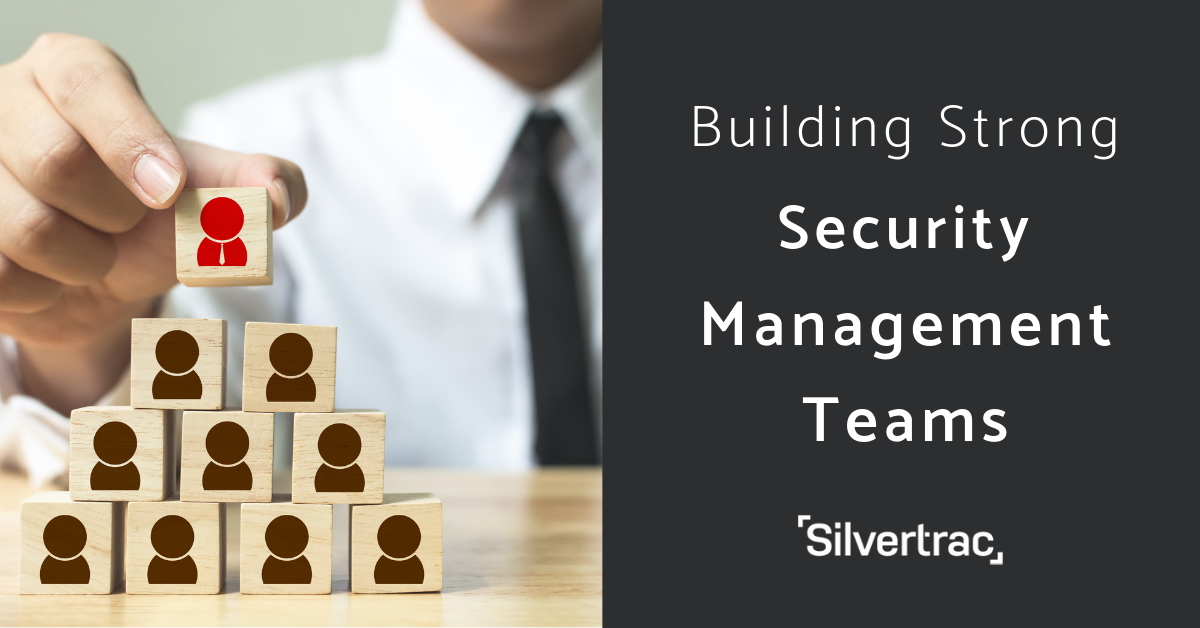The Silvertrac Extra
Building Strong Security Management Teams

What does it take to build & maintain a strong leader on a security management team? It starts with hiring and training, but that’s certainly not where it ends. The strongest supervisors work continuously on developing their leadership skills and advancing their team.
Traits of a Successful Supervisor
According to Google’s Project Oxygen, the top 10 behavioral traits of any great leader include:
- Good coach
- Empowers doesn’t micromanage
- Establishes and fosters an inclusive environment
- Productive and result-oriented
- Good communicator
- Encourages career development
- Has a clear action plan
- Has technical skills to advise the team on
- Cross-functional team collaborator
- Strong decision maker
While many of these traits can be learned and tested in the workplace, it's often times easier to find someone to fit the bill in the recruitment process. And within our industry, where so many individuals come from law and military backgrounds, you are bound to find a "rockstar" who can fit right in.
Recruitment & Interviewing
As we know, recruiting top talent in the security guard industry can be challenging. But it’s an important building block for developing a strong team, and getting the right kind of supervisors on staff will lay the foundation for the rest of your employees.
If your budget allows, utilizing an executive search firm to find exemplary supervisors is a great option. These firms can help you identify top candidates in your area that you may not have found otherwise. However, most security companies don’t have the budget for these types of services, in which case we turn to successful security hiring techniques to determine the best candidates.
Here are a few helpful interviewing techniques to keep in mind when evaluating supervisor candidates:
- Ensure the candidate knows the job - Ask interview questions that will clearly show that a candidate understands the industry, the jargon, and the duties/responsibilities of the role they applied for.
- Look for a fitting personality - Do you feel like you can trust this person? Do you enjoy talking to them? Do you anticipate them fitting in well with the company? Do you think their management style will fit in with the environment you are creating?
- Research the candidate - Talk to the candidate’s references and people they have worked with. This will give you an idea if they are practicing what they preach. Not only do you want to make sure they can execute tasks effectively, but it will provide insight into what type of supervisor they actually are.
- Hire smart candidates - Strive to always hire smart people. Bringing in smart individuals means they will dive into your company with the excitement and brain power to quickly grasp what is needed of them and mentor those around them. We should always be looking to grow from those around us.
- Ask about behavior - It’s easy for someone to describe what they would do in a potential situation, but you will get a better gauge of what they will actually do by asking them to describe their behavior in past events. These recollections will expose their true values and skills.
Continued Education & Growth Plans
Once you have a supervisor with the proper foundation on-board, it’s time to think about their continued education and growth plans. In order to be an effective leader, it is important that supervisors actively work on bettering themselves and their team.
These are just a few easily-implemented strategies that can help maintain company and personal growth.
- Individual Planning - If you have hired well, you will have on-boarded a supervisor who is hungry to grow. Creating a personal development growth plan will provide a path to work towards an immediate drive for personal development that will be reflected in their day-to-day role.
- Team Planning - Personal growth is just as important as team and security company growth. Bringing the leaders of teams together for cross-functional strategy development is extremely important. It illuminates everyone's role and how each team should work together to drive toward greater success for the company. It’s critical that people feel important and purposeful.
- Evaluations - Not only should every security team member go through employee performance evaluations, but leaders and mangers as well. It is important to assess the goals that are put in place, understanding what is working well and what needs improvement. Only then can a team truly understand if they are being successful.
- Corporate Training - Just like any skill, supervisory skills must be continually improved. Once or twice a year, all supervisors should go through management training/updates alongside on-going guard training. It will keep them up-to-date on current managerial best practices and the importance of their role top-of-mind.
- Mentoring - As you interview non-supervisor candidates, look for individuals who have supervisor potential. Having a malleable employee who is open to learning from an already great supervisor will provide a space for immediate "go-getters" and future team expansion.
If you can implement just a few of the above processes into your own security organization, you are bound to have a top-notch security management team. This team will embody the characteristics, passion, and mentorship to your company that you desire; traits money just can’t buy.




